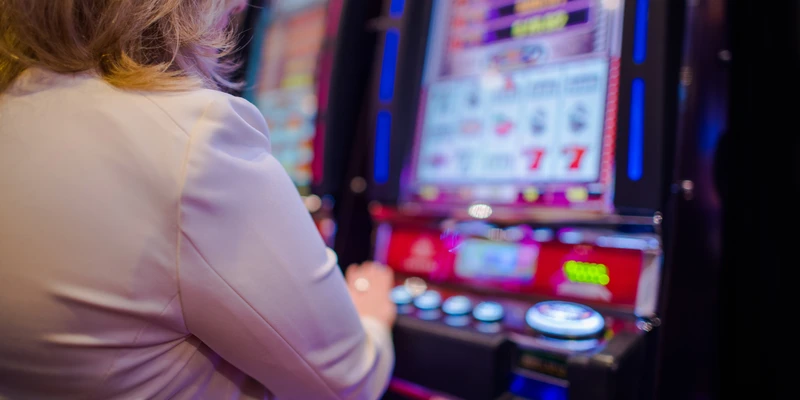Table of Contents
Toggle
Dra. Emma Collins
Clinical Psychiatrist & Medical Detox Specialist
When gambling shifts from a source of entertainment to something that quietly takes over your time, money, and peace of mind, it can leave you feeling trapped, ashamed, or alone.
Fortunately, you don’t have to figure out a way out on your own. Therapy for gambling addiction helps you understand why the urge keeps coming back and how to finally take control of it.
You might be wondering: why is it so hard to walk away from something you know is causing harm? And how exactly does therapy break that cycle? This article lays out the answers with clarity.
If you’ve never had gambling explained to you this way, it may be the perspective shift you need to move forward for yourself and for those who care about you.
Therapy for Gambling Addiction
Therapy for gambling addiction is focused on helping you identify and change harmful thought patterns, build emotional regulation skills, and develop effective strategies to reduce cravings and prevent relapse. Various types of psychotherapy and clinical support options are available, depending on your needs and stage of recovery.
Cognitive Behavioral Therapy (CBT)
Cognitive behavioral therapy is one of the most effective and widely used forms of treatment for gambling behavior. CBT helps you examine cognitive distortions about gambling, such as believing a win is “due” or that losses can be recouped with just one more bet.
Therapists guide clients through exercises that challenge irrational beliefs, promote alternative behaviors, and build emotional resilience. One of the first case studies, conducted in the 1990s, showcased the effectiveness of CBT.
The 6-month case study showed a significant reduction in gambling (10 episodes per month to 3) following a 10-session CBT intervention on a patient with a 26-year history of pathological gambling.
The intervention targeted three main beliefs: the idea of a foolproof system, the myth that losses could be balanced by future wins, and the minimization of financial consequences. This structured, evidence-based approach to treatment has become a cornerstone of gambling treatment programs worldwide.
Behavioral Therapies
In addition to CBT, other behavioral therapies focus on modifying actions and reactions linked to gambling. Techniques such as exposure therapy help patients confront triggers in a safe, controlled environment without acting on the urge to gamble.
These therapies may incorporate individual and group work, family involvement, and practical exercises such as stress management and activity planning. Incorporating healthy routines and avoiding high-risk situations can significantly support recovery.

Motivational Interviewing
Motivational interviewing is a client-centered form of talk therapy that enhances internal motivation. It’s especially effective for people who are ambivalent about change or in the early stages of seeking help.
Rather than offering advice, therapists ask reflective questions that help clients explore how gambling may conflict with their values or goals. This process helps build commitment and openness to additional treatment steps, such as CBT or group therapy.
Medications and Psychiatric Care
In cases where psychiatric disorders such as depression, anxiety, or bipolar disorder co-occur, medications may be included in your treatment program. SSRIs, mood stabilizers, and in some cases, opioid antagonists (like naltrexone) are used to treat both the addiction and underlying mood dysregulation.
A mental health professional or psychiatrist can assess your needs and guide appropriate medication trials. Medications work best when combined with ongoing therapy and support networks.
Support Systems and Recovery Programs
Recovery is not a solo effort. Strong peer support, family engagement, and access to structured programs play a vital role in reducing gambling triggers and maintaining progress.
Group Therapy and Peer Support
Group therapy provides a space to share experiences, challenges, and successes with others who understand what it’s like to live with a gambling problem. These groups foster accountability, reduce isolation, and often enhance personal insight.
Facilitators guide discussions and teach strategies for navigating high-risk situations. Over time, group participation can improve emotional support, conflict resolution, and coping skills, key tools for long-term change.
Gamblers Anonymous and Support Groups
Gamblers Anonymous (GA) is a widely recognized self-help group based on the 12-step model used by Alcoholics Anonymous. Meetings are available in person and online, offering confidentiality and community for those struggling to stop gambling.
Alternatives like SMART Recovery use evidence-based techniques such as CBT, rather than spiritual frameworks, to guide change. Many people also benefit from helpline resources like the National Problem Gambling Helpline, which provides confidential support and referral services.
Family Therapy
Since a gambling disorder affects the entire family system, family therapy is often a valuable component of treatment. It creates a space where trust can be rebuilt, communication improved, and collective coping strategies developed.
Sessions often include education about the origins of addiction, boundary-setting, and collaborative planning. For partners or children impacted by problem gambling, therapy can provide relief, structure, and healing.

Treatment Settings and Long-Term Recovery
Choosing the right setting is essential to the success of your gambling treatment. Both outpatient and inpatient residential treatment options provide structured care designed to meet different needs.
Outpatient and Intensive Outpatient Programs
Outpatient treatment allows you to receive care while maintaining daily responsibilities. These programs typically include counseling sessions, group therapy, education, and relapse prevention.
Outpatient care works well for those with moderate symptoms and strong support systems. Intensive outpatient programs (IOPs) offer more frequent sessions and additional structure, especially beneficial for individuals facing higher relapse risk or co-occurring conditions.
Residential Treatment Options
When gambling behavior is severe or previous treatments haven’t been effective, residential treatment may offer the best path forward. These programs remove individuals from everyday gambling environments, providing 24/7 care at a treatment facility.
Structured schedules, professional treatment, and peer interaction support holistic healing. Services typically include psychodynamic therapy, family support, mindfulness training, and discharge planning to prepare for life after treatment.
Developing a Treatment Plan and Relapse Prevention
An effective treatment plan includes personalized goals, realistic timelines, and regular evaluation. Your therapist will help identify gambling triggers, map high-risk situations, and create behavioral strategies that align with your values and lifestyle.
Relapse prevention is a central component, focusing on early intervention, emergency planning, and self-monitoring. A solid plan should evolve with your recovery and emphasize skills that maintain progress in the face of stress, boredom, or exposure to gambling cues.
Navigating High-Risk Situations and Gambling Triggers
Understanding what leads you to start gambling is crucial for lasting recovery. Gambling involves more than chance; it often reflects emotional pain, avoidance, or faulty beliefs.
High-risk moments might include emotional stress, access to money, or reminders of past gambling experiences. Through therapy, you’ll learn to recognize these cues and respond with healthy alternatives, such as reaching out to a sponsor, practicing grounding techniques, or leaving risky environments.
Over time, you’ll build the confidence and resilience needed to manage urges without returning to old behaviors.

Understand Gambling Addiction Some More
Gambling addiction, also known as a gambling disorder, is a serious behavioral addiction that affects emotional health, financial stability, and personal relationships. It often develops gradually, fueled by highs and lows, distorted thinking, and increasing preoccupation with gambling.
According to a recent World Health Organization report, approximately 1.2% of the world’s adult population is affected by a gambling disorder. Beyond personal distress, problem gambling contributes to relationship breakdowns, family conflict, financial loss, emotional neglect of children, and, in some cases, illegal activity. Gambling is also a known channel for money laundering, raising broader concerns about its societal impact.
Signs and Symptoms of Gambling Addiction
Recognizing the signs of compulsive gambling is the first step toward recovery. People affected are often preoccupied with gambling, spending excessive time thinking about past wins or planning future bets. Many experience restlessness or irritability when trying to stop.
Warning signs include needing to wager larger sums for the same level of excitement, hiding your behavior, or continuing to gamble despite serious consequences. Chasing losses (continuing to gamble in an attempt to recover money) is a key indicator of maladaptive gambling behavior.
Over time, work, school, and relationships may suffer. Borrowing money, selling personal items, or neglecting responsibilities to gamble are common red flags.
Causes and Risk Factors
The development of gambling addiction is influenced by a combination of biological, psychological, and environmental factors. Patients with a family history of addiction, co-occurring psychiatric disorders, or trauma may be at greater risk.
Environmental factors such as frequent exposure to gambling advertisements, easy access to betting apps or casinos, and substance use may also increase the likelihood of developing a gambling problem. Some gamble to escape emotional pain, using it as a form of self-soothing during stress, loneliness, or depression.
Age is another factor, with younger and middle-aged adults being more susceptible. The belief that you can “win back” what you’ve lost can keep you locked in a cycle that is difficult to escape.
Impact of Gambling on Individuals and Families
A gambling disorder affects more than just your finances. While mounting debt, unpaid bills, and lost savings are common, the emotional impact can be equally damaging.
Relationships often suffer under the weight of secrecy, trust violations, and emotional distance. Family members (especially children) may feel neglected or confused by mood swings and inconsistent behavior. Emotional consequences such as anxiety, depression, and shame can accumulate over time, reinforcing the cycle of addiction.
Treat Gambling Disorder at Twilight Recovery
Compulsive gambling, excessive gaming, and substance misuse may look different on the surface, but they often come from the same place: a desire to feel better, to disconnect, or to cope with what’s unspoken. Twilight Recovery offers a place to slow down, get honest, and start healing in a setting where you’re understood.
We’ll help you reconnect with the part of yourself that’s ready for something better.
Frequently Asked Questions
What are the most effective types of therapy for compulsive gambling?
CBT is the most widely supported and effective form of treatment for gambling issues. It targets the thoughts and beliefs that sustain addiction while building healthier behaviors.
Are there specific counseling options available for gambling addicts?
Yes. Individual counseling sessions offer a private space to explore challenges and plan recovery. Many combine this with group therapy or residential treatment for a more intensive approach.
What kind of support groups exist for individuals with a gambling problem?
Support groups such as Gamblers Anonymous, SMART Recovery, and other gambling treatment programs offer structure, community, and peer-based encouragement.
Can family therapy contribute to the recovery process from gambling addiction?
Absolutely. Family therapy helps repair strained relationships, educate loved ones, and build a stronger foundation for recovery.
How long does treatment typically last for someone with a gambling addiction?
It varies. Some individuals see improvement in a few months, while others require ongoing care for a year or more. Treatment is most effective when tailored to your needs and monitored by treatment providers.







